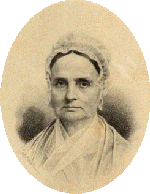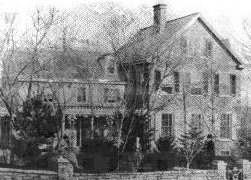|
Because abolitionists had trouble finding people willing to rent meeting
space to them, they bought Pennsylvania
Hall in 1838, and the Anti-Slavery Convention of American Women was
scheduled to start its first session on May 14th of that year. But anti-abolitionists,
angered that Black women would be attending, tried to disrupt the gathering.
The mayor of Philadelphia requested that Black women not be allowed to
attend the convention, but the abolitionists refused. A mob burned the
hall to the ground.
The
Mott family entertained other abolitionists often, including Sojourner
Truth, Frederick Douglass, and William Garrison, and the Mott family home
became a stop on the Underground Railroad. She helped establish the Stephen
Smith Home in Philadelphia, a nursing home for people of color. And when
the Quaker college at Swarthmore opened in 1869, Lucretia brought two oak
trees from Roadside to plant on the campus as a memorial to her husband,
who had served on the Board of Managers which established the school. She
is buried in Philadelphia at the Friends
Fair Hill Burial Ground. |

